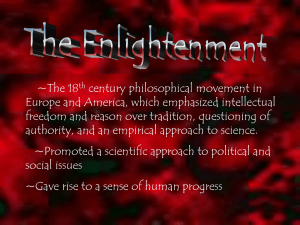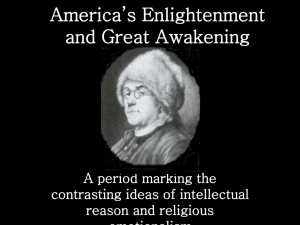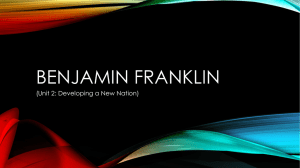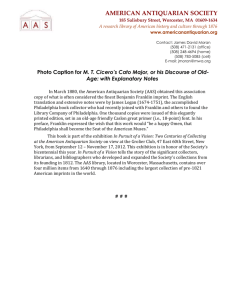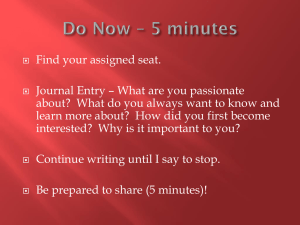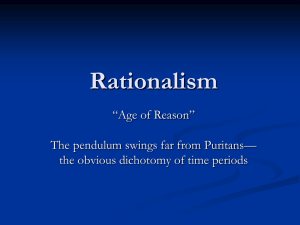America's Enlightenment and Great Awakening
advertisement
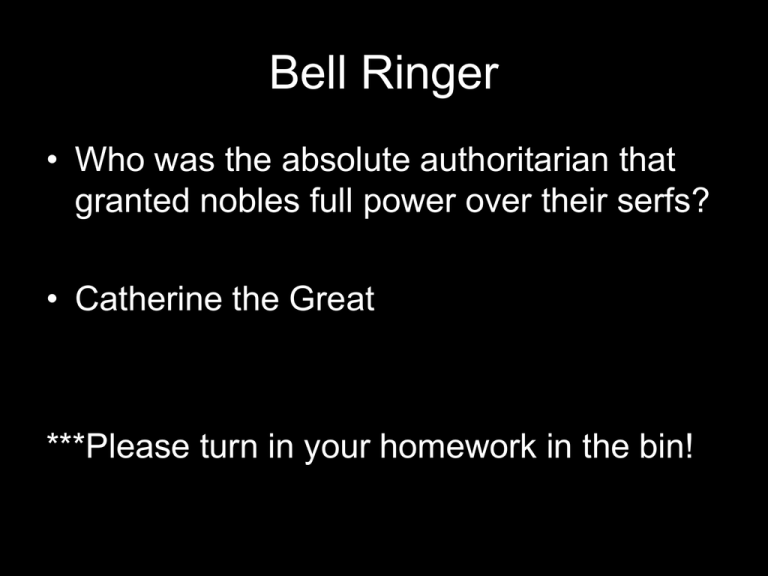
Bell Ringer • Who was the absolute authoritarian that granted nobles full power over their serfs? • Catherine the Great ***Please turn in your homework in the bin! Agenda/Objectives • Review of the unit so far. • How are the American colonies impacted by the Enlightenment? • Benjamin Franklin!!! The myth the legend! • Deism and the watchmaker theory. Review • Who came up with the idea of Natural Rights? • Who came up with the idea of separation of powers and checks and balances? • Who had the pen name Voltaire? Review • Who was the king of Austria that gave religious freedom to all minority religions? • Who is the Father of Capitalism? • Who was the person that dissected humans and proved over 200 conclusion of Galen to be false? Benjamin Franklin • Arguably the most influential man in the history of the United States! • Watch the documentary and write 5 facts about the man, the myth, the legend! America’s Enlightenment and Great Awakening A period marking the contrasting ideas of intellectual reason and religious emotionalism Literacy • The American Colonies were the most literate society in the world (90% of males in NE, 40% of females) • Literacy throughout varied from 35-50%. England averaged about 30%. • Despite widespread literacy books were fairly rare; people were moved by persons who had the power of the spoken word. New Ideas Great advances in Europe (Newton) moved the world as people became more dependent on reason to unlocking the laws of nature. Inspired others to search for reason. John Locke • Character of individuals was not fixed could be changed through education. • Governmental power was not derived through god to monarchs but rather was derived from the need to preserve “life, liberty, and property” of the governed. The Father of America’s Enlightenment • Franklin and the Junto a mutual improvement society, bent on debate. • Poor Richards Almanack: a collection of essays, maxims, and proverbs. – Early to bed and early to rise, makes a man healthy, wealthy, and wise – Well done is better than Well said. – A penny saved is a penny earn ed – There will be sleeping enough in the grave. Franklin’s Impact Other impacts: started volunteer fire department, first library, founded the college of Philadelphia (now Penn) which founded the first medical school. An elected political leader, judge. Led innovations in electricity, stoves for heating, etc… Insurance Founded the Philadelphia Library The Philadelphia Hospital, the nations first—courtesy of Franklin Philadelphia Hospital • "to care for the sick-poor and insane who were wandering the streets of Philadelphia." • "a melting pot for diseases, where Europeans, Africans and Indians engaged in free exchange of their respective infections." • Franklin saved the day with a clever plan to counter the claim by challenging the Assembly that he could prove the populace supported the hospital bill by agreeing to raise 2000 pounds from private citizens. If he was able to raise the funds, Franklin proposed, the Assembly had to match the funds with an additional 2000 pounds. The Assembly agreed to Franklin's plan, thinking his task was impossible, but they were ready to receive the "credit of being charitable without the expense." • Franklin's fundraising effort brought in more than the required amount. American Philosophical Society • American Philosophical Society: 1743 (Jefferson a later president) “all philosophical experiments that let light into the nature of things tend to increase the power of man over matter, and multiply the conveniences and pleasures of life”. • Other impacts: started volunteer fire department, first library, founded the college of Philadelphia (now Penn) which founded the first medical school. Electricity, stoves, etc… Deism • Deists: rational god who created the universe not to intervene. • Religion? Viewed as valuable as it regulated morals. Deism and the Watchmaker Theory • Enlightenment age religion that advocated a belief in God (even if that belief was irrational) • God was there in the beginning, and will be there in the end, but in between we’re on our own • Imagine an old style windup watch……God made the watch and wound it up, but then left it alone. He’ll be back when the watch needs to be rewound • No need for prayer or worship – it’s counterproductive – God’s not listening anyway • Humans have ultimate free choice and free will • Many of the American founding fathers believed in Deism – Thomas Jefferson was probably the most famous • Voltaire also advocated Deism and the right to freedom of religion American Revolution • Not really a classic “revolution” in the sense that a social class did not revolt against the one above it • Really more of a war for independence, but it did incorporate rhetoric from the Age of Reason • American revolutionary LEADERS studied Locke and others – they certainly believed in the rhetoric, but the average “patriot” in the street paid little in the way of taxes, so “no taxation without representation” was little more than a slogan. • The new government formed after the revolution was at least outwardly based on enlightenment principles, although it would be decades before most of those principles were actually put into practice – think of how long it took women to receive the vote. Declaration of Independence • Written by Thomas Jefferson • Restatement of the social contract • List of grievances – what King George III did to break the contract • Considered the first true government document containing enlightenment principles • Used as a pattern for revolutions around the world Writing Prompt • Imagine the Enlightenment never took place. How do you think the world would be shaped today? Give specific examples of how you think people would be and how our society would be shaped? • Minimum of 2 paragraphs.

